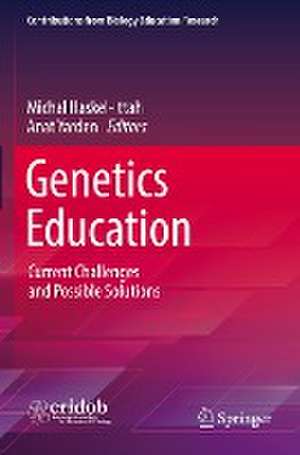Genetics Education: Current Challenges and Possible Solutions: Contributions from Biology Education Research
Editat de Michal Haskel-Ittah, Anat Yardenen Limba Engleză Paperback – 19 ian 2023
| Toate formatele și edițiile | Preț | Express |
|---|---|---|
| Paperback (1) | 776.09 lei 6-8 săpt. | |
| Springer International Publishing – 19 ian 2023 | 776.09 lei 6-8 săpt. | |
| Hardback (1) | 781.94 lei 6-8 săpt. | |
| Springer International Publishing – 18 ian 2022 | 781.94 lei 6-8 săpt. |
Preț: 776.09 lei
Preț vechi: 946.45 lei
-18% Nou
Puncte Express: 1164
Preț estimativ în valută:
148.52€ • 153.43$ • 123.61£
148.52€ • 153.43$ • 123.61£
Carte tipărită la comandă
Livrare economică 26 martie-09 aprilie
Preluare comenzi: 021 569.72.76
Specificații
ISBN-13: 9783030860530
ISBN-10: 3030860531
Pagini: 177
Ilustrații: X, 177 p. 1 illus.
Dimensiuni: 155 x 235 mm
Greutate: 0.27 kg
Ediția:1st ed. 2021
Editura: Springer International Publishing
Colecția Springer
Seria Contributions from Biology Education Research
Locul publicării:Cham, Switzerland
ISBN-10: 3030860531
Pagini: 177
Ilustrații: X, 177 p. 1 illus.
Dimensiuni: 155 x 235 mm
Greutate: 0.27 kg
Ediția:1st ed. 2021
Editura: Springer International Publishing
Colecția Springer
Seria Contributions from Biology Education Research
Locul publicării:Cham, Switzerland
Cuprins
Part I: Reflecting upon the content of genetic curriculum.- Chapter 1. Should we give peas a chance? An argument for a Mendel-free biology curriculum (Kampourakis).- Chapter 2. How can epigenetics be used to integrate nature and nurture in genetics education? (Gericke).- Chapter 3. How can we teach genetics for social justice? (Reiss).- Part II. Reflecting upon processes for constructing students’ understanding in genetics.- Chapter 4. How can learning progressions support the development of genetic literacy? (Duncan).- Chapter 5. How can we help students reason about the mechanisms by which genes affect traits? (Haskel-Ittah).- Chapter 6. How might authentic scientific experiences promote an understanding of genetics in high school? (Yarden).- Part III: Reflecting upon the relationship between genetics learning and related conceptions and beliefs.- Chapter 7. Is Belief in Genetic Determinism Similar Across Countries and Traits? (Gericke).- Chapter 8. Why does multiple and interactive causation render comprehension of genetics phenomena difficult and what could genetics educators do about it? (Hammann).- Chapter 9. How are high-school students' teleological and essentialist conceptions expressed in the context of genetics and what can teachers do to address them? (Stern).- Chapter 10. How can we make genetics education more humane? (Donovan).
Notă biografică
Professor Anat Yarden is Head of the Department of Science Teaching at the Weizmann Institute of Science, and Head of the Biology Group at this Department. She holds an undergraduate degree in Agricultural Sciences (from the Hebrew University of Jerusalem), a master’s degree and a PhD in molecular biology (from the Weizmann Institute of Science), and has carried out postdoctoral training in Genetics (at Stanford University). The primary theme in all of her academic activities has been adapting practices employed by scientists to the processes by which students and teachers accumulate and advance their knowledge within the discipline of biology.
Dr. Michal Haskel-Ittah is a senior scientist at the Department of Science Teaching at the Weizmann Institute of Science. She holds an undergraduate degree in Life Sciences (from Ben-Gurion University), a master’s degree and a PhD in molecular biology (from the Weizmann Institute of Science), and has carried out postdoctoral training in Science Teaching (the Weizmann-Abroad combined program – Rutgers University and the Weizmann Institute of Science). Her research group studies the learning and teaching of biological mechanisms and the development of mechanistic reasoning.
Dr. Michal Haskel-Ittah is a senior scientist at the Department of Science Teaching at the Weizmann Institute of Science. She holds an undergraduate degree in Life Sciences (from Ben-Gurion University), a master’s degree and a PhD in molecular biology (from the Weizmann Institute of Science), and has carried out postdoctoral training in Science Teaching (the Weizmann-Abroad combined program – Rutgers University and the Weizmann Institute of Science). Her research group studies the learning and teaching of biological mechanisms and the development of mechanistic reasoning.
Textul de pe ultima copertă
This edited volume presents the current state of the art of genetics education and the challenges it holds for teaching as well as for learning. It addresses topics such as how genetics should be taught in order to provide students with a wide and connected view of the field. It gives in-depth aspects that should be considered for teaching genetics and the effect on the student’s understanding. This book provides novel ideas for biology teachers, curriculum developers and researchers on how to confront the presented challenges in a way that may enable them to advance genetics education in the 21st century. It reviews the complexity of teaching and learning genetics, largely overlooked by biology textbooks and classroom instruction. It composes a crucial component of scientific literacy.
Caracteristici
Presents an overview on the complexity of teaching genetics Provides practical implications for teaching genetics Explains the state-of the art research in genetics education




